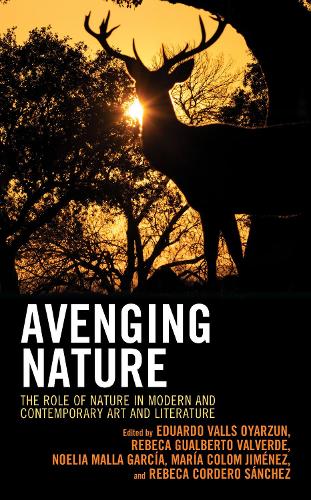
Avenging Nature: The Role of Nature in Modern and Contemporary Art and Literature
(Hardback)
Publishing Details
Avenging Nature: The Role of Nature in Modern and Contemporary Art and Literature
By (Author) Eduardo Valls Oyarzun
Edited by Rebeca Gualberto Valverde
Edited by Noelia Malla Garcia
Edited by Mara Colom Jimnez
Edited by Rebeca Cordero Snchez
Contributions by Anastasia Cardone
Contributions by Frank Izaguirre
Contributions by Laura de la Parra
Contributions by Jessica Roberts
Contributions by Laura Sanz Garca
Bloomsbury Publishing PLC
Lexington Books
28th September 2020
United States
Classifications
Professional and Scholarly
Non Fiction
Non-graphic and electronic art forms
809.9336
Physical Properties
Hardback
258
Width 161mm, Height 228mm, Spine 279mm
581g
Description
Nature, thou art my goddessEdmunds bold assertion in King Lear could easily inspire and, at the same time, function as a lamentation of the inadequate respect of nature in culture. In this volume, international experts provide multidisciplinary exploration of the insubordinate representations of nature in modern and contemporary literature and art. The work foregrounds the need to reassess how nature is already, and has been for a while, striking back against human domination. From the perspective of literary studies, art, history, media studies, ethics and philosophy, and ethnology and anthropology, Avenging Nature highlights the need of assessing insurgent discourses thatconverging with counter-discourses of race, gender or classrealize the empowerment of nature from its subaltern position. Acknowledging the argument that cultural representations of nature establish a relationship of domination and exploitation of human discourse over nonhuman reality and that, in consequence, our regard for nature as humanist critics is instrumental and anthropocentric, the present volume advocates for the view that the time has come to finally perceive natures vengeance and to critically probe into natures ongoing revenge against the exploitation of culture.
Reviews
Avenging Nature comprises an exceptionally insightful collection of top-quality analyses of the portrayal of "insubordinate nature" in a carefully selected corpus of literature, art, and film from Europe and North America. Working from multiple theoretical focuses, contributors to this important volume reassess how cultural producers articulate nature's "striking back" and vengeance against longstanding anthropocentrism. This book is a major international contribution to ecocritical scholarship.
--Shelley Godsland, University of AmsterdamNature is certainly avenged through this book, Avenging Nature. The Role of Nature in Modern and Contemporary Art and Literature bears witness to the wealth of creative global responses to an endangered nature in the Anthropocene. Its chapters distill the ecological wisdom of literature, art, and cinema from the early twentieth-century production of Spanish symbolist poet and painter Santiago Rusiol to the groundbreaking genetic writing of Christian Bk in The Xenotext. It highlights the disturbing message of dystopian narratives such as Jeff Vandermeer's The Southern Reach Trilogy or Zal Batmanglij's The East while reflecting anew on some classics of nature writing such as Annie Dillard's Pilgrim at Tinker Creek. This book deserves the attention of those seeking to understand how ecocritical thinking applied to manifold artistic expressions serves to unearth the voice of nature to make it heard loud and clear.
--Diana Villanueva Romero, Universidad de ExtremaduraThis topical and timely exploration of the fraught relationship between humanity and nature along three major axes--ecocritical ethics, empowering nature and dystopias--comprises sixteen finely honed contributions by an international array of scholars. Focusing predominantly on contemporary Anglophone literature, the individually-authored chapters analyse how cultural texts have engaged in various yet interrelated ways with the aforementioned relationship through approaches that scholars and students hitherto unfamiliar with the topic or with its literary and cultural inscriptions will find compelling.
--Glyn Hambrook, University of WolverhamptonAuthor Bio
Eduardo Valls Oyarzun lectures at the Department of English and American Literature, Complutense University of Madrid.
Rebeca Gualberto Valverde works as assistant professor at the Complutense University of Madrid.
Noelia Malla Garca works as an assistant professor of English at the Department of English Philology at the University of Extremadura.
Mara Colom Jimnez works as an assistant professor at Complutense University of Madrid.
Before becoming a language teacher, Rebeca Cordero Snchez worked as a research assistant in the English Department at the Complutense University of Madrid.
